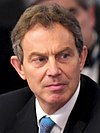Related Research Articles
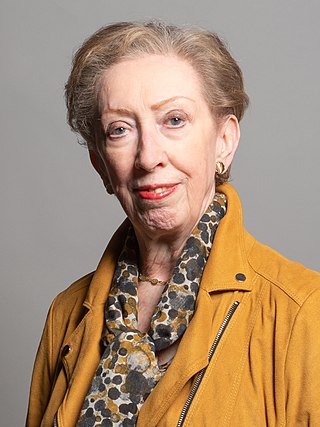
Margaret Mary Beckett, Baroness Beckett,, is a British politician. She was a member of Parliament (MP) for more than 45 years, first from 1974 to 1979 and then from 1983 to 2024. A member of the Labour Party, she was the United Kingdom's first female foreign secretary, and served as a minister under Prime Ministers Harold Wilson, James Callaghan, Tony Blair and Gordon Brown. Beckett was Deputy Leader of the Opposition and Deputy Leader of the Labour Party from 1992 to 1994, and briefly Leader of the Opposition and acting Leader of the Labour Party following John Smith's death in 1994. A member of the Labour Party, she served as MP for Lincoln from 1974 to 1979, and for Derby South from 1983 to 2024. Her 45 years in the House of Commons makes her the female MP in the Commons with the longest service overall, and she was the last sitting MP who served in the Labour governments of the 1970s.
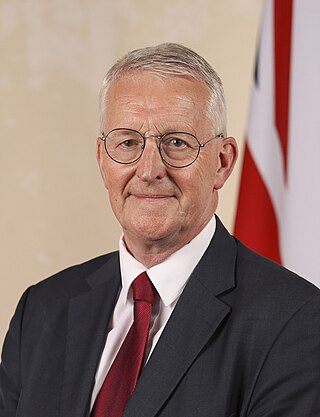
Hilary James Wedgwood Benn is a British politician who has served as Secretary of State for Northern Ireland since 2024. A member of the Labour Party, he has been the Member of Parliament (MP) for Leeds South, formerly Leeds Central, since 1999. He previously served in various ministerial positions under Prime Ministers Tony Blair and Gordon Brown from 2001 to 2010.
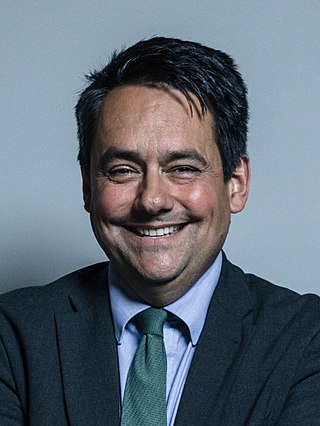
Stephen Daniel Twigg is a British Labour Co-op politician who has served as the 8th Secretary-General of the Commonwealth Parliamentary Association since August 2020. He served as Member of Parliament for Enfield Southgate from 1997 to 2005, and for Liverpool West Derby from 2010 to 2019.

Dame Angela Eagle DBE is a British Labour Party politician serving as the Member of Parliament (MP) for Wallasey since 1992. Eagle has served as Minister of State for Border Security and Asylum since July 2024.
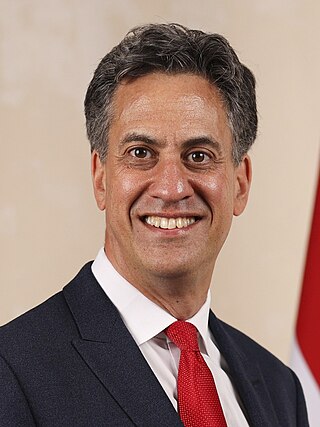
Edward Samuel Miliband is a British politician who has served as Secretary of State for Energy Security and Net Zero since July 2024. He has been Member of Parliament (MP) for Doncaster North since 2005. Miliband was Leader of the Labour Party and Leader of the Opposition from 2010 to 2015. Alongside his brother, David Miliband, he served in the Cabinet from 2007 to 2010 under Prime Minister Gordon Brown.

Patrick Bosco McFadden is a British politician who has served as Chancellor of the Duchy of Lancaster since July 2024. A member of the Labour Party, he has served as the Member of Parliament (MP) for Wolverhampton South East since 2005. McFadden has previously held various junior ministerial positions and shadow portfolios in his parliamentary career between 2005 and 2024.

Katherine Anne Green is a British politician serving as Deputy Mayor of Greater Manchester for Policing and Crime since 2023. She previously served as Member of Parliament (MP) for Stretford and Urmston between 2010 and 2022. A member of the Labour Party, she served as Shadow Minister for Women and Equalities from 2015 to 2016, Chair of the Committees on Privileges and Standards from 2018 to 2020, and Shadow Secretary of State for Education from 2020 to 2021.
The Commons members of the Parliamentary Labour Party (PLP) elected 19 members of the Shadow Cabinet from among their number in 2010. This follows the Labour Party's defeat at the 2010 general election, after which the party formed the Official Opposition in the United Kingdom.
Elections to the Labour Party's Shadow Cabinet took place in July 1992. Shadow Cabinet elections generally take place at the beginning of a parliamentary session, but the 1992 vote was postponed until a new leader was elected to replace Neil Kinnock. Under the rules then in effect, the Commons members of the Parliamentary Labour Party elected 18 members of the Official Opposition Shadow Cabinet, who were then assigned portfolios by the leader. The Commons members of the PLP separately elected the Chief Whip, and the Labour peers elected the Leader of the Opposition in the House of Lords. In addition, the Leader of the Labour Party and Deputy Leader were members by virtue of those offices. The 18 elected members of the Shadow Cabinet were the ones with the largest number of votes, except that the three women with the most votes would be included in the 18, even if they were not among the top 18 based on the number of votes.
Elections to the Labour Party's Shadow Cabinet took place in October 1993, at the beginning of the 1993/1994 session of parliament. Under the rules then in effect, the Commons members of the Parliamentary Labour Party elected 18 members of the Official Opposition Shadow Cabinet, who were then assigned portfolios by the leader. The Commons members of the PLP separately elected the Chief Whip, and the Labour peers elected the Leader of the Opposition in the House of Lords. In addition, the Leader of the Labour Party and Deputy Leader were members by virtue of those offices. The 18 elected members of the Shadow Cabinet were the ones with the largest number of votes. Beginning with this election, MPs were required to vote for at least four women, but women were no longer guaranteed three places in the Shadow Cabinet.
Elections to the Labour Party's Shadow Cabinet took place in October 1994, at the beginning of the 1994/5 session of parliament. Under the rules then in effect, the Commons members of the Parliamentary Labour Party elected 18 members of the Official Opposition Shadow Cabinet, who were then assigned portfolios by the leader. The Commons members of the PLP separately elected the Chief Whip, and the Labour peers elected the Leader of the Opposition in the House of Lords. In addition, the Leader of the Labour Party and Deputy Leader were members by virtue of those offices. The 18 elected members of the Shadow Cabinet were the ones with the largest number of votes. MPs were required to vote for at least four women, but women were not necessarily guaranteed places in the Shadow Cabinet.
Elections to the Labour Party's Shadow Cabinet took place in October 1995, at the beginning of the 1995/6 session of parliament. Under the rules then in effect, the Commons members of the Parliamentary Labour Party elected 19 members of the Official Opposition Shadow Cabinet, who were then assigned portfolios by the leader. The Labour peers elected the Leader of the Opposition in the House of Lords. In addition, the Leader of the Labour Party and Deputy Leader were members by virtue of those offices. With this election, for the first time, the role Opposition Chief Whip was simply another portfolio to be handed out rather than an office separately elected by the PLP. The 19 elected members of the Shadow Cabinet were the ones with the largest number of votes. MPs were required to vote for at least four women, but women were not necessarily guaranteed places in the Shadow Cabinet.
Elections to the Labour Party's Shadow Cabinet took place in July 1996. Under the rules then in effect, the Commons members of the Parliamentary Labour Party elected 19 members of the Official Opposition Shadow Cabinet, who were then assigned portfolios by the leader. The Labour peers elected the Leader of the Opposition in the House of Lords. In addition, the Leader of the Labour Party and Deputy Leader were members by virtue of those offices. The 19 elected members of the Shadow Cabinet were the ones with the largest number of votes. MPs were required to vote for at least four women, but women were not necessarily guaranteed places in the Shadow Cabinet.
Vere Bird Jr. was an Antiguan lawyer and politician who served as chairman of the Antigua Labour Party (ALP) and a government minister. He was the son of Vere Bird, the former Prime Minister of Antigua and Barbuda, and brother of Lester Bird, who later held the same position.

John Smith was Leader of the Labour Party and Leader of the Official Opposition from 18 July 1992 until his death on 12 May 1994. Smith became leader upon succeeding Neil Kinnock, who had resigned following the 1992 general election—for the fourth successive time, the Conservatives had won and Labour lost.
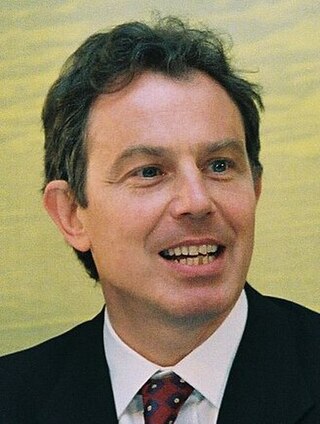
Tony Blair was Leader of the Labour Party and Leader of the Opposition from his election as Leader on 21 July 1994 until he became Prime Minister on 2 May 1997. Blair became leader upon the death of John Smith.

Neil Kinnock was Leader of the Labour Party and Leader of the Opposition from 2 October 1983 to 18 July 1992. He convincingly defeated Roy Hattersley, Eric Heffer, and Peter Shore in the 1983 leadership election, which was prompted by Michael Foot's resignation following the disastrous general election result earlier that year. Kinnock's period as Leader encompassed the bulk of the Thatcher premiership and the first two years of the Major premiership. Kinnock resigned in 1992 after losing his second election as Leader.
Elections to the Labour Party's Shadow Cabinet took place on 23 October 1991. Under the rules then in effect, the Commons members of the Parliamentary Labour Party elected 18 members of the Official Opposition Shadow Cabinet, who were then assigned portfolios by the leader. The Commons members of the PLP separately elected the Chief Whip, and the Labour peers elected the Leader of the Opposition in the House of Lords. In addition, the Leader of the Labour Party and Deputy Leader were members by virtue of those offices.
On 26–29 June 2016, 21 members of the Shadow Cabinet resigned from the frontbench. Following the Leave result in the referendum on Britain's membership of the European Union, Jeremy Corbyn faced heavy criticism for the perceived reluctance of his involvement in the campaign to Remain and his perceived weakness as leader of the Labour Party.
In the aftermath of relatively poor results in the 2021 local elections, Keir Starmer carried out a May 2021 shadow cabinet reshuffle.
